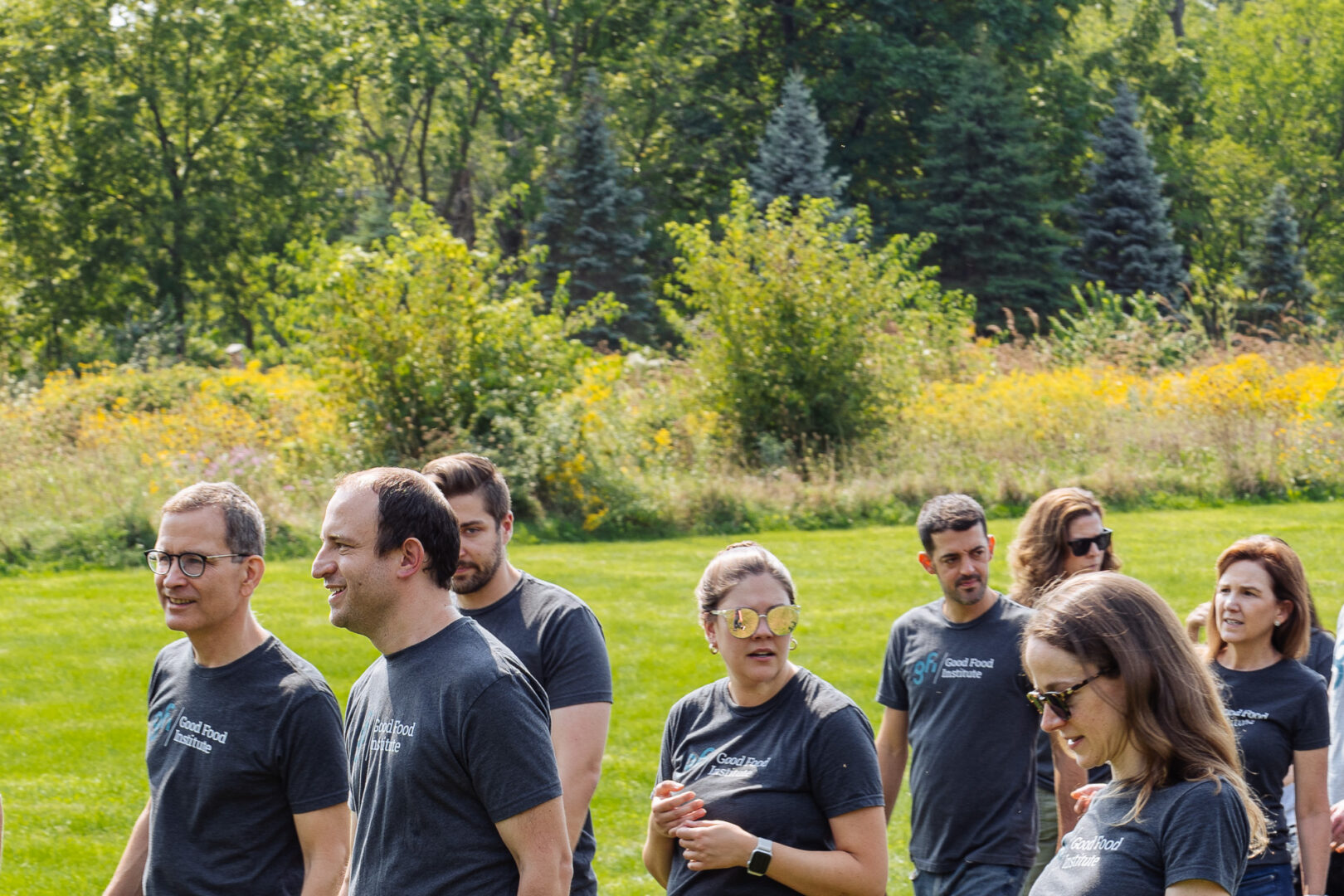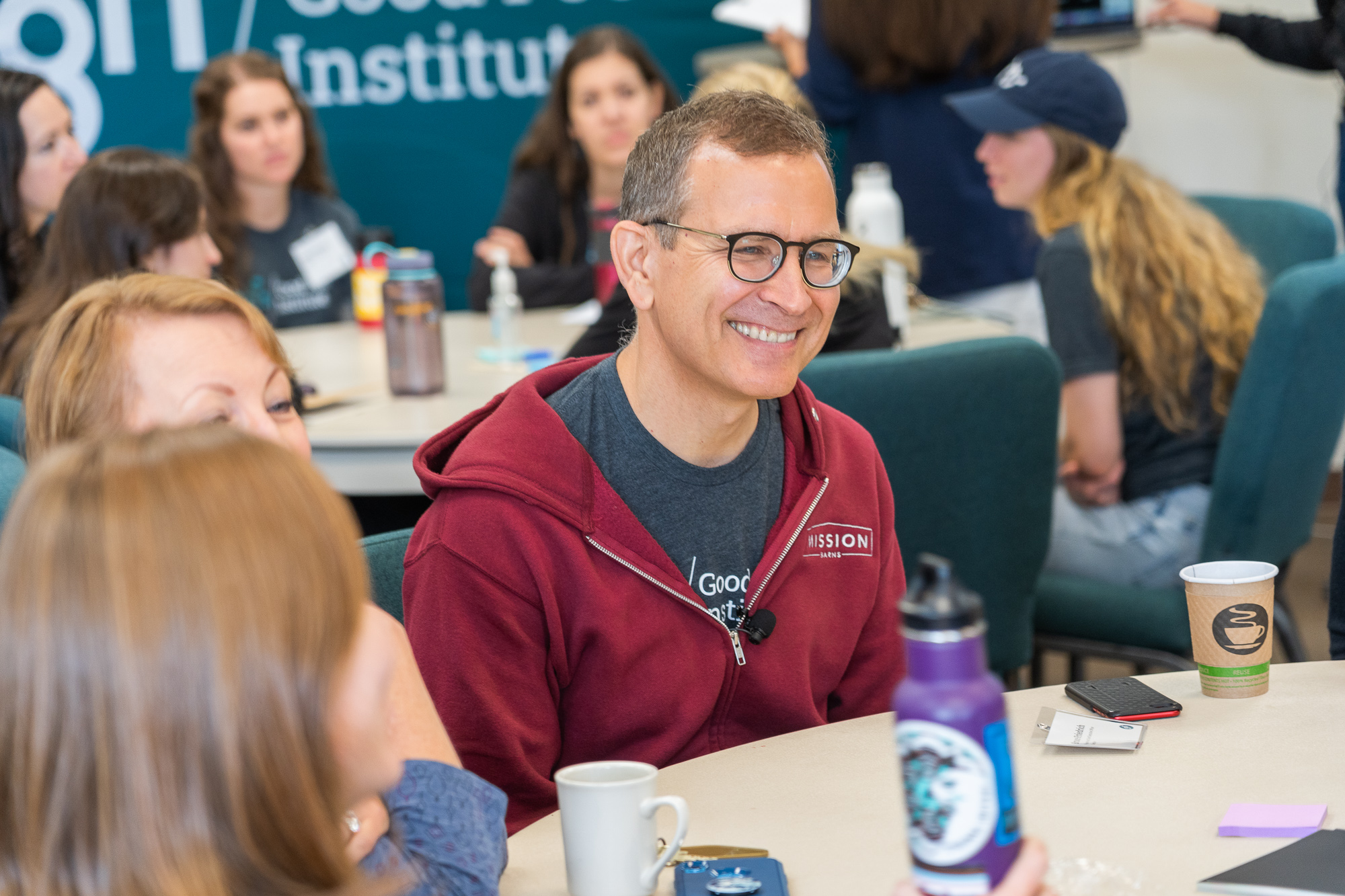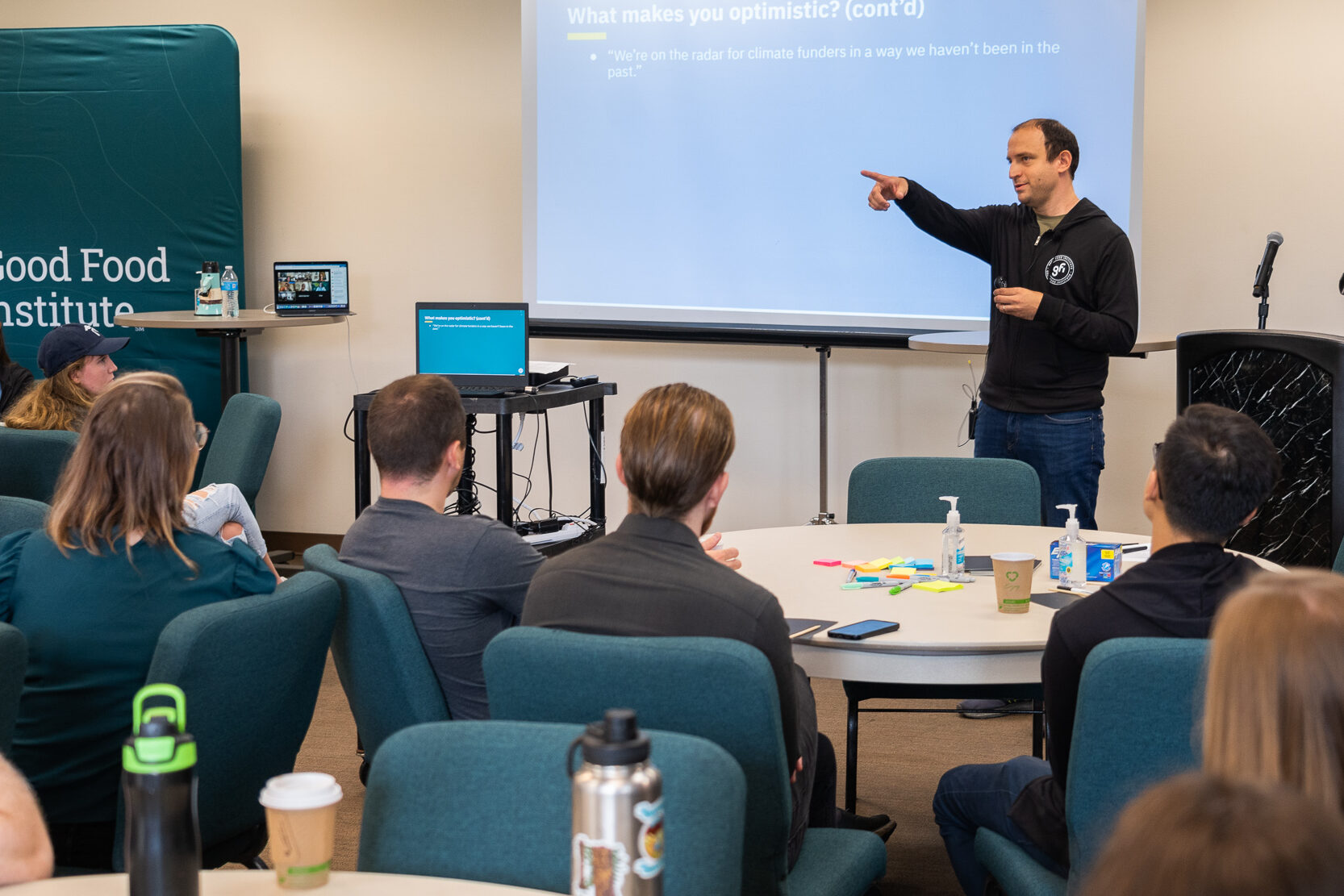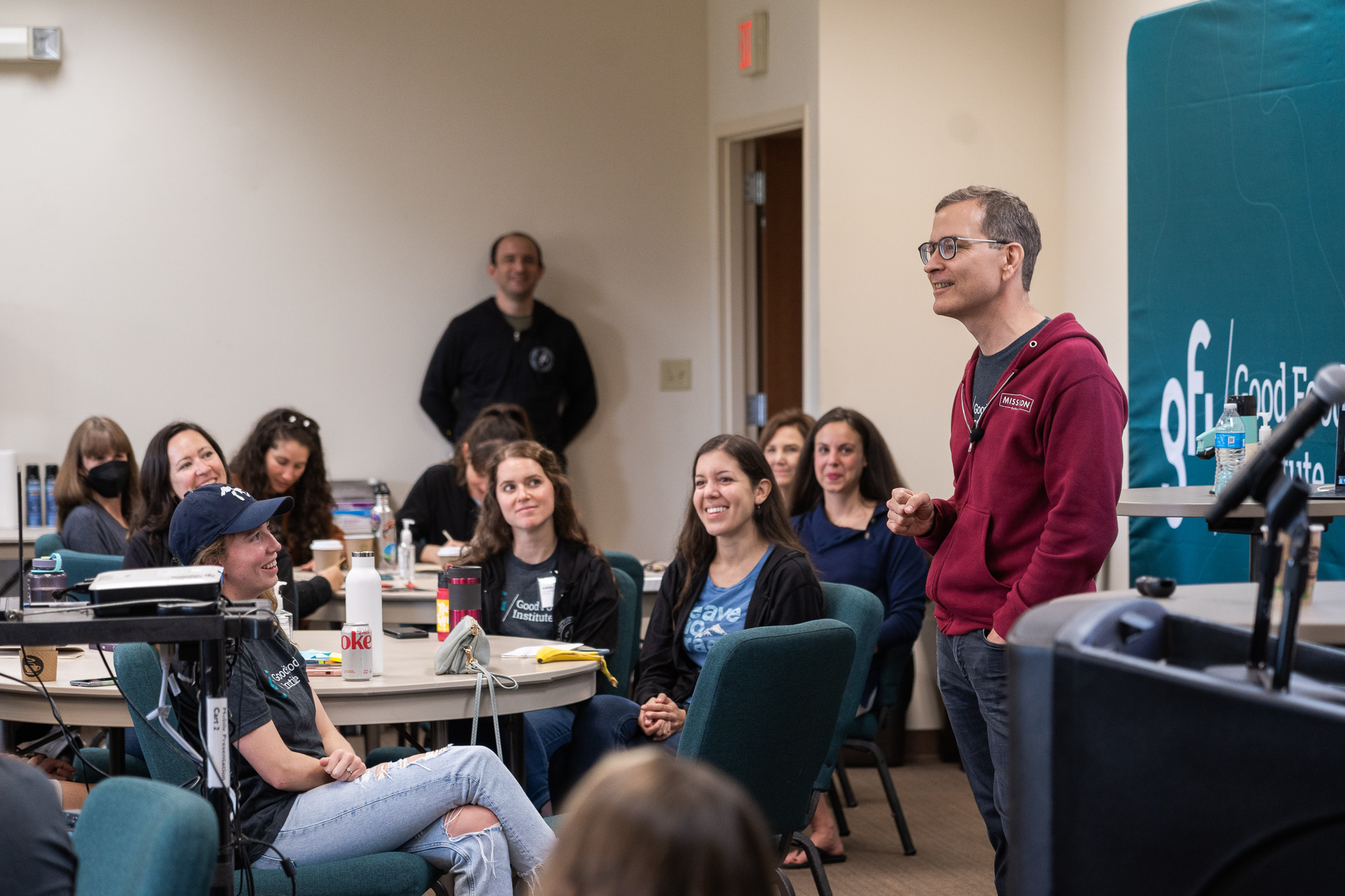Fall 2022 reflections from GFI founder and president Bruce Friedrich

World in motion
My bike rides are extra good and head-clearing these days. Maybe it’s the season—fall is gorgeous here in D.C. Or maybe it’s the life lessons these deliver every single time: bike rides in the District are humbling reminders to stay focused, present, and attentive.
Both are likely true, but there’s another reason my bike rides are extra good these days. This moment in time—the moment that I’m in, that the organization I started working on just a bit more than seven years ago is in, and that the world is in—is extraordinary, stunning, and stark, all at once. My bike rides are extra good these days for the same reason my GFI-life is extra good: forward momentum. Governments are signaling support for alternative proteins in new and significant ways; advances in science and technology are happening fast; and universities worldwide are cultivating next-gen alt protein talent who will undoubtedly pick up the pace.
While signs are positive for alt proteins and what we’re trying to accomplish, it’s also true that we live in an especially dire moment in time. The world’s most vulnerable people are experiencing the full brunt of climate-driven harms. More and more land is devoted to animal feed and ruminant grazing. Species are going extinct at a record pace, as forests continue to be burned down to grow feed for farm animals, and massive amounts of waste from industrial animal agriculture pollute our ocean and freshwater ecosystems. We are speeding toward a world where antibiotics no longer work. Pandemic risk is growing. All of these harms will hit the world’s most vulnerable the hardest.
“We have both an opportunity and obligation to act. We must keep this forward momentum. And at GFI, this is our commitment—to work as hard and as smart as possible to create a world where alternative proteins are no longer alternative.”
Bruce Friedrich
Every single peer reviewed study that has been done predicts that the world will consume at least 60 percent more meat by 2050—most predictions hover around 100 percent more. The work GFI teams are doing to change how meat is made will mitigate climate change, preserve biodiversity, increase food security, and lessen global health risks around antibiotic resistance and pandemic risk—and it will remove billions of animals from intensive systems that deny them their animal-ness. And I get to do this worthy work alongside others who never cease to amaze and inspire me.
As I celebrate and reflect on seven years of building GFI full time, I’m going to take a bicycling-in-heavy-traffic moment (focused, present, attentive) to offer a few thoughts on the moment, share some exciting GFI leadership team news, and serve up a few thoughts on what’s ahead.
Roughly 10 miles into a century ride
It’s October 2022. Just three years ago, public funding for alternative proteins was very close to zero dollars per year. In less than three years, $300 million has gone into alt proteins from more than a dozen countries, plus additional hundreds of millions of dollars in government investments and incentives for alternative protein companies. This progress is exciting—and yet to unlock the full potential of alternative proteins, it is estimated that $10 billion per year in global public spending on R&D and commercialization is needed. GFI’s policy teams in the United States, India, Israel, Brazil, Singapore, the UK, and at the EU are focused on securing this level of public funding, along with multilateral research and development partnerships, that can address the industry’s biggest technical challenges, inspire additional research, create new opportunities for growth, and ensure these sustainable foods can benefit everyone.
In science and innovation, we’re seeing advances in alt protein crop development, precision fermentation, and cultivated meat technologies as more researchers and funding enter the field. It’s especially exciting to see two key things on this front: First, GFI’s formative technological readiness and techno-economic analyses are informing the scientific focus for governments and universities as they decide where to devote resources that our policy teams have secured. Second, GFI’s ecosystem-building efforts are bringing in new scientists from a diversity of disciplines, and at different points in their careers. Just this year, GFI’s Alt Protein Project—a student-driven program aimed at turning universities into engines of alternative protein progress and innovation—is in high demand and is set to double to 36 universities across six continents.
While this forward momentum is worth celebrating, success is not inevitable. It’s impossible to miss the recent struggles of the incumbent plant-based meat companies. If we’re going to create a world where alt proteins are no longer alternative, we must double down on open access science, government support for alt protein companies (as has worked for the renewable energy and electric vehicle sectors), and lots more scientific ecosystem building—all focused on creating products that compete on price and taste. As I said to New York Times columnist Ezra Klein about 18 months ago, “If we leave this endeavor to the tender mercies of the market, there will be vanishingly few products to choose from and it’ll take a very long time.”
In short: It was not inevitable that we’d get to where we are now, and the progress we’re making is inspiring. It’s also not inevitable that we’ll get where we need to go; we need to double down on what’s working and do a whole lot more of it. I’m incredibly proud of our teams around the world doing just that. (And if you too want to keep up with GFI’s monthly highlights charting GFI’s progress around the world, sign up here).
Incremental changes and steps forward remain important, and I’m so proud of the role GFI has played in building this momentum. But there is so much farther to go—and we need to move as quickly as we possibly can. This brings me to the second thing on my mind—the GFI team today.

Best bike club ever
Believe change is possible. Do the most good we can. Share knowledge freely. Act on evidence. Invite everyone to the table. These are GFI’s fundamental values, and the roughly 170 full time GFI team members who make up our global teams live them every single day.
I am grateful to have talented individuals at the head of each of our six GFI organizations around the world inspiring and leading their teams, and today I’m deeply pleased to share that Ilya Sheyman has stepped into the role of CEO for GFI U.S., leading all U.S. programs and operations.
When Ilya joined the team this past February, our goal was for him to run GFI in the U.S. He came ready to tackle this work on Day 1, with an impressive career spent propelling social change, organizing movements, and building and growing impact-driven teams. He has succeeded beyond our highest expectations, demonstrating incisive strategic thinking, excellent mentorship, and brilliance with both people and processes.

As I move out of day-to-day decision-making for the U.S. team, I will be able to: more fully step into a role evangelizing our theory of change with key global stakeholders and the media; work to raise funds to power our expanding global network; support our independent global affiliates in ensuring that they are each running aligned, maximally impactful organizations with excellent internal culture, systems, and structures; and catalyze growth of the alt protein ecosystem. I will remain on the board of GFI U.S. and of each of GFI’s other five independent affiliates around the world.
Given the stakes, I cannot even begin to adequately express my gratitude—to Ilya for agreeing to take the mantle of GFI in the U.S., to every GFI team member in the US and around the world, and to our extraordinarily generous community of donors.
“GFI’s work with scientists, businesses, and policymakers across the global food system is powered by philanthropy. It is the support of each and every donor that enables us to move forward the change we know is possible: to sustainably and securely feed the world in ways that are good for our planet, for people, and for animals.”
BRUCE FRIEDRICH
Eyes on the road ahead
The road ahead requires each of us to stay focused, present, and attentive.
The current issue of Foreign Policy Magazine includes an article that I co-authored with Climate Advisers CEO Nigel Purvis that calls for robust government support for alternative proteins R&D and private sector incentives. And in just a few short weeks, GFI is co-hosting the first-ever Food Systems Pavilion at COP27, the biggest and most important climate conference of the year.
As I write this, all six GFI organizations are charting the course for their work in 2023 and beyond, focusing on building the momentum (and teams) to ensure that alternative proteins are established for success in their respective regions (follow along at gfi.org/plan). They’re prioritizing work in areas that are neglected across policy, industry, and science—work that will have an outsized impact as we work toward our ambitious goals to secure sizable funding for alt proteins, clear regulatory pathways, ensure we have a robust scientific ecosystem, and inspire industry to place alt proteins at center stage.

We’ve really only just begun to scratch the surface of alternative proteins’ potential to not only feed a growing global population and remove billions of animals from industrial farms, but also to aid planetary recovery by enabling a shift away from more resource-intensive and polluting ways of making food.
“If we can keep forward momentum growing—at the pace and scale needed—the field of alternative proteins will offer the world a fundamentally different and far more sustainable and secure food future.”
BRUCE FRIEDRICH
There are days I can’t believe how far we’ve come. I’m often overwhelmed with gratitude, deep respect, and awe at those I get to work alongside—our GFI teams around the world, our global community of supporters, our partners, colleagues, and fellow food system innovators.
I’m immensely proud of the first few miles we’ve already put into this century ride. But what gets us back up on the bike is the road ahead—the distance-to-destination. Each and every day, our GFI teams around the world remain uber-aware of how far we have to go before alternative proteins are no longer alternative.

